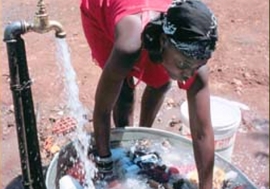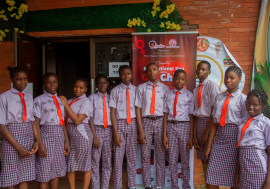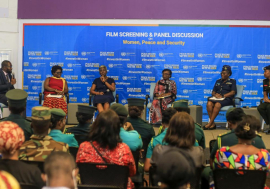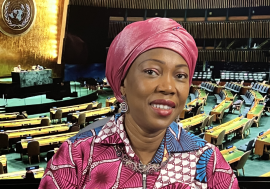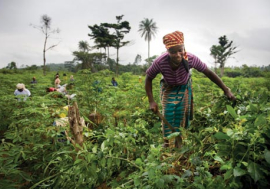Harnessing the Internet for development
While Africa’s post-independence leaders dreamed of linking their countries through road and railway networks, today’s leaders are on the cusp of making their own dream come true — connecting African countries with each other and the rest of the world through a high-speed telecommunications cable. Originating in Durban, South Africa, a broadband telecommunications cable will stretch underwater for 9,900 kilometres through the Indian Ocean to its final destination, Port Sudan. The East Africa Submarine Cable System (EASSy) will, among other functions, support broadband Internet connections that transmit information at up to 40 times the speed of dial-up telephone links. Such high-speed connections allow users to download large files such as video clips or listen to online radio.
EASSy is one of the information and communications technology (ICT) projects of the continental development plan, the New Partnership for Africa’s Development (NEPAD). In June, African telecommunications and technology ministers endorsed the immediate start of the project, which is expected to cost $300 mn and is due for completion in 2007. The project will significantly cut telecommunications costs within Africa and with countries overseas, thereby helping the continent to bridge the “digital divide” — the gulf between people and countries with access to knowledge and information and those without.
 Many Africans would like to use the Internet in their own languages.
Many Africans would like to use the Internet in their own languages.‘African solidarity’
“We must commit ourselves to ensuring the successful implementation of the NEPAD broadband ICT infrastructure project,” says South African Communication Minister Ivy Matsepe-Casaburri. The project, she says, offers responses to the continent’s challenges “through African solidarity and partnership” and will “promote African self-sufficiency.”
The EASSy project is part of an African plan to ensure that all countries are connected to each other through a broadband system. These countries will in turn be linked to the rest of the world through other submarine cables. Currently, the lack of adequate broadband connections has been a major hindrance to Africa’s promotion of greater ICT use. There are few direct high-capacity Internet links between African countries. High-capacity transmission lines are mainly concentrated in the US, Europe and Asia.
As a result, about 75 per cent of Internet traffic in Africa first goes through Europe or the US and is then routed back, a very costly process. For example, while Benin and Burkina Faso are neighbours, Internet traffic between them passes through France or Canada. The International Development Research Centre (IDRC) in Canada estimates that Africa spends $400 mn each year on the use of international bandwidth for national or regional data. In fact, in many cases, e-mails sent between two Internet service providers in the same country are sent abroad and then rerouted back because domestic “Internet exchange points” are lacking.
The slow pace of Internet development on the continent is reflected in low levels of use. Only 2.6 per cent of Africans have access to the Internet, compared with 10 per cent of Asians, 36 per cent of Europeans and 69 per cent of North Americans. When broken down by country, the level of Internet use in most of Africa is even lower, since two countries, Egypt and South Africa, account for nearly half of all users.
Low-speed transmission lines also mean that Internet users in Africa find it much faster and cheaper to download material rather than to post their own onto the Internet. This leaves Africans primarily as consumers instead of producers of Web content. To redress this imbalance, and in line with pledges to develop a more inclusive Internet that they made at last year’s World Summit on the Information Society (WSIS) in Tunisia, African countries have initiated a series of ICT projects. In addition to EASSy, these include a venture by South Africa to involve the public in the development of its Internet domain “.za”, attempts to translate software and other Web tools into African languages to allow more Africans to produce their own Web content, and numerous efforts to broaden the use of the Internet for distance learning.
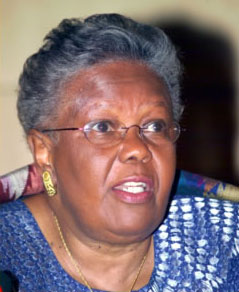 South African Communication Minister Ivy Matsepe-Casaburri: Her country's goal is to make the Internet accessible to the majority.
South African Communication Minister Ivy Matsepe-Casaburri: Her country's goal is to make the Internet accessible to the majority.A truly public Internet
In South Africa, the government recently launched a programme to make the Internet a truly public good by soliciting input from citizens on how they want the country’s electronic communications system to operate. The move opens up to public discussion an area that has so far been the preserve of computer experts, and is part of a plan to establish rules to guide the use of the country’s Internet domain name “.za”. Just as with any other medium, decisions have to be made about how to allocate, manage and regulate space.
A few years ago, the South African government appointed a local committee to run its Internet domain in the public interest. It had previously been operated by an individual who pioneered Internet development in the country. In order to be more inclusive, the committee will solicit input from South Africans, in ordinary language that people outside the Internet community can relate to, says Minister Matsepe-Casaburri, “so that even my granny can understand.” The goal is to create policies that will make the Internet accessible to the majority, while reducing poverty and spreading information on health and development.
In its brief life, the Internet has evolved into an agent of revolutionary change in health, education, journalism, politics and other sectors. It is increasingly being used to transmit lifesaving medical information, coordinate relief for victims of natural disasters and provide uncensored information to people trapped under repressive governments.
The World Summit on the Information Society, which took place in two phases – in Switzerland in 2003 and in Tunisia last year – has given a new impetus to Africa’s efforts to harness this tool, argues Prof. Olivier Nana Nzepa, an ICT lecturer at Cameroon’s University of Yaounde. The key question, he says, is how to achieve the WSIS principles of “transparency, public accountability, public participation and equity,” while simultaneously promoting much wider use of ICTs.
Language diversity
Another area of growing concern is the absence of African languages on the Internet. The dominance of European languages has limited the spread of Internet use by excluding those not fully literate in those languages. African information ministers meeting in Dakar, Senegal, last year urged new programmes to promote African and other languages on the Internet. This, they argued, would help “fight against the linguistic digital divide and ensure the participation of all in the emerging new society.”
The original design of the Internet’s domain name system had a strong technical bias towards English. Even languages such as French, Spanish and German are at a disadvantage when it comes to naming Internet hosts, because they use accented characters that the system does not support. In addition, existing tools to create Web pages, such as HTML (Hyper Text Mark-up Language), are based on English or other Western languages, requiring programmers to be functionally literate in those languages to generate content.
“Limiting people to the use of ICTs in a foreign language tends to exacerbate the digital divide, makes ICT adoption long, difficult and expensive, and impoverishes local cultures,” notes a study by the Pan African Localization Project. Funded by Canada’s IDRC and implemented by non-governmental African ICT and language development organizations Kabissa and Bisharat, the project seeks to “localize” software and Internet content by using Arabic and African languages.
The three-year project, launched in 2005, will survey the current state of localization in Africa, hold a training workshop for experts and develop a Web-based database of resources. “This is a timely and exciting project that has the potential to speed the evolution and increase the impact of information technology in Africa,” says Mr. Don Osborn of Bisharat.
Creating local content and laying high-speed cables to carry it will make it easier to use the Internet as an effective tool for education. Governments generally acknowledge that building more classrooms and training more teachers to reach those currently outside the school system cannot by themselves lead to universal primary education by 2015, one of the Millennium Development Goals (MDGs) adopted by UN member states in 2000.
“Providing connectivity through the use of the Internet and computers to schools and public centres is one of the priorities of governments,” says Ms. Josephine Ouédraogo, acting deputy executive secretary at the UN Economic Commission for Africa (ECA), headquartered in Addis Ababa. “ICTs have already begun to exert massive transformation of education systems worldwide. The best teachers in the world are becoming available anywhere at the click of a mouse.”
Ethiopia, one of Africa’s poorest nations, has networked all of its 500 secondary schools and 12 universities. Established distance learning services in Botswana, Cameroon, Côte d’Ivoire, Gambia, Ghana, Guinea, Mauritius, Mozambique, Namibia, Nigeria and Tanzania are being augmented by ICT applications. And in many African countries multipurpose community telecentres are hooked up to the African Virtual University, an online college headquartered in Kenya, and schools are connected across national boundaries to other schools in 31 countries under a programme called SchoolNet Africa.
Beyond the need for greater financing for such efforts, the challenges of broadening Internet access “require a new commitment to work together if we are to realize the benefits of the information society,” says International Telecommunication Union Secretary-General Yoshio Utsumi. “Seeing the fruits of today’s powerful knowledge-based tools in the most impoverished economies will be the true test of an engaged, empowered and egalitarian information society.”










